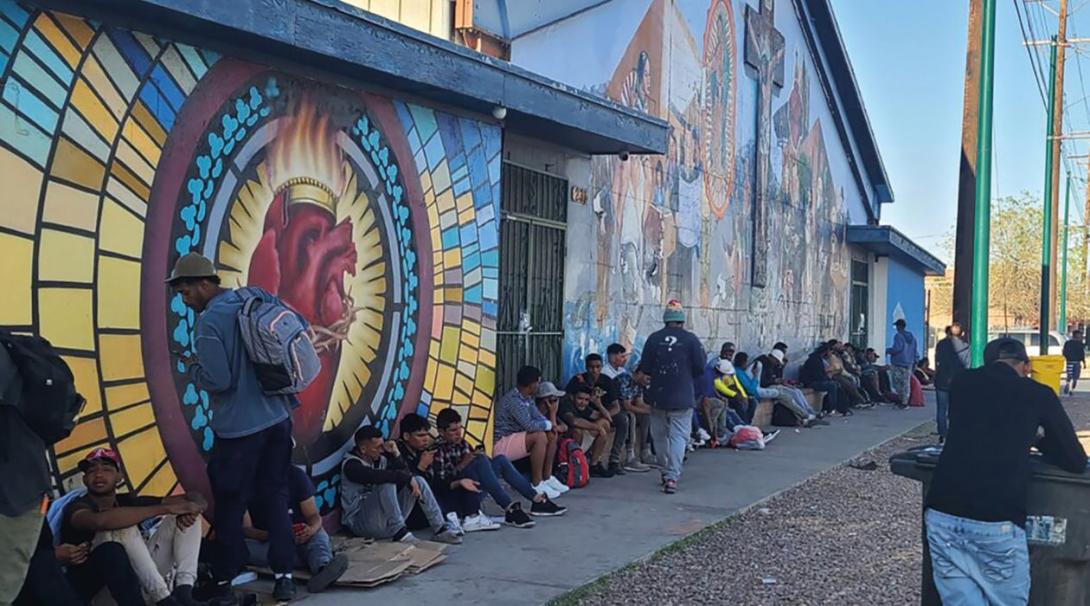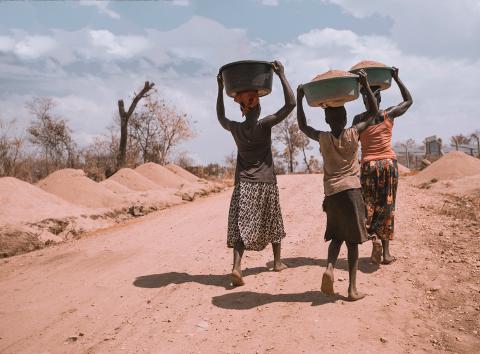People putting faith in action near El Paso, Texas, in the 50th anniversary year of this Catholic mission-sending community

Photo by Fr. Rafael Garcia, SJ | mklm.org
Nearly thirty-five years after returning from mission in Venezuela, Linda Savio and Bill Hallerman are serving Venezuelans again—this time in the couple’s hometown of Seattle and at the border in El Paso.
Linda and Bill were Maryknoll lay missioners from 1986 to 1990, and as returned missioners routinely say, “once a missioner, always a missioner.” It’s a call that stays with you for life—and like so many others, Bill and Linda keep answering it.
“The border seems like a natural place for returned missioners to go, with the experience that we have,” Bill says. “Especially for those who are in other kinds of ministries in their home communities now, to be able to have a touchpoint with that kind of work, it resonates for us in so many ways.”
Maryknoll Lay Missioners is a U.S.-based Catholic mission-sending community—celebrating its fiftieth anniversary this year—with a simple yet profound objective: to put faith into action by serving those in need around the world. It is committed to nonviolence through the prevention, intervention, reconciliation, and restoration of all creation.
Long-term missioners and their families work in nine African, Asian, and American countries. They are teachers, healthcare workers, community advocates, attorneys, and more.
While Maryknoll lay missioners are found all over the globe, they also minister closer to home, on both sides of the Texas-Mexico border—in El Paso and Ciudad Juárez—as well as in Mexicali, Mexico, near the California border. And because of strong interest in volunteering at the border on the part of returned lay missioners as well as Maryknoll Affiliates (laity who commit to the mission goals of Maryknoll as they pursue their own life journeys), there is a new community in El Paso for them: Bethany House.
In August 2024, Maryknoll Lay Missioners, in collaboration with Maryknoll Affiliates, signed a lease on a house that has six bedrooms and space for gatherings for returned lay missioners and affiliates who want to provide service through the migrant shelters at the border. It’s possible in the future that those who are discerning whether to become lay missioners may have the opportunity to volunteer and stay at the house as well.
“Their service will be appreciated by the partners of migrant shelters that are in need of volunteers,” says Elvira Ramirez, executive director of Maryknoll Lay Missioners. “The hope is that this intentional community will make it possible to increase the capacity of shelters to serve the needs of migrants.”
Bill Hallerman, who is agency director at Catholic Community Services of King County, and Linda Savio, a retired teacher, were thrilled by the news of this opportunity—and they can attest to the need for volunteers.
Returning to roots
By some estimates, nearly 8 million Venezuelans are displaced globally, with the majority currently residing in nearby countries in Latin America and the Caribbean. They are desperately fleeing violent crime, inflation, and shortages of food and medicine. In the past two years, unprecedented numbers of Venezuelan migrants have crossed the border into the United States. Many of them have made it to Washington, which historically ranks as one of the top refugee resettlement states in the U.S. Linda and Bill, both fluent in Spanish, volunteer with migrants, many of whom are Venezuelan, at an encampment site near Seattle run by a Methodist church for hundreds of asylum-seekers. But they also feel compelled to do more.
“Being with Venezuelans again, it’s like we stepped back in time. Their accents, the things they talk about, the places they’re from, it’s all so familiar to us,” Bill says.
Two years ago, the couple made it down to Annunciation House, a longtime El Paso volunteer organization that offers hospitality to migrants, immigrants, and refugees. Rooted in Catholic Social Teaching, the volunteers of Annunciation House live simply and in community, in the same houses as the guests they serve, who are mostly from Mexico and Central America. The organization also participates in advocacy and education around immigration issues.
“At that time, two or three busloads of people were coming to the center every day,” Bill says. “They needed a lot of volunteers and staff to take care of everyone.”
While there, Linda and Bill met current Mary-knoll lay missioner Heidi Cerneka. An immigration attorney, Heidi works with Las Americas Immigrant Advocacy Center, advocating as a legal representative for migrants who have suffered human trafficking and could benefit from relief from deportation or from U.S. laws designed to protect victims of crimes.
Another current Maryknoll lay missioner, Deirdre Griffin, who is also a Sister of St. Joseph, works at Las Americas Immigrant Advocacy Center as an immigration attorney as well. She is also a community volunteer at Annunciation House, where she welcomes people recently released from immigration custody, providing shelter, food, clothing, and assistance while they are making travel arrangements to join their loved ones.
“We know the situations they are coming from. We know the struggles folks had in their home countries. And we speak their
languages.” —Bill Hallerman
Rounding out the Maryknoll lay missioner team in El Paso is Coralis Salvador, who, after serving as a lay missioner in Kenya for nineteen years, felt called in 2019 to support the newly reestablished Maryknoll Lay Missioners presence at the U.S.-Mexico border. She works at Casa Francisco, a shelter for migrants and asylum seekers, and she coordinates hospitality at Bethany House. She also serves at Encuentro Project border immersion program for participants who come from schools, universities, and parishes to learn about the true issues facing the border and the migrants, refugees, and asylum-seekers who come there.
“Many missioners like us have lived and worked in the cultures that are at the border now. We know the situations they are coming from. We know the struggles folks had in their home countries. And we speak their languages,” Bill says. “We want to get back down there soon. In fact, we regularly meet with a group of other returned missioners and we’re going to discuss the possibility of all of us going together.”
Building on past efforts
Today’s Maryknoll presence at the U.S.-Mexico border continues the legacy started by a previous team that worked there from 1995 until 2009. In 1995, it was returned lay missioners who took the lead on a new project there. The North American Free Trade Agreement (NAFTA) had recently gone into effect, and hundreds of thousands of Mexicans came to work in factories, mostly operated by U.S. corporations, in Ciudad Juárez, where the salary was just $5 a day.
“Maryknoll is best known for our work outside the United States. But part of the mission has always been to return to the United States with the stories of the people whom we have worked with. Our vision was that by living and working at the border, missioners would be able to bring together the two worlds of Maryknoll,” wrote returned lay missioner West Cosgrove in a 2020 article, “Turning walls into bridges.” [https://mklm.org/returned-missioners/turning-walls-into-bridges/]
Cosgrove, who had missioned in Venezuela from 1985-1992, was among the returned missioners who headed the new El Paso project and who worked alongside residents in a variety of ministries on both sides of the border.
“Border cities in the U.S. are among the poorest and most neglected communities in the country, and we continue to live off the sweat and blood of those who work for slave wages in factories on the Mexican side of the border. Immigration and border issues continue to be in the news, and immigrants are still not respected or valued in the United States,” Cosgrove wrote.
In 2009, Ciudad Juárez became known as the murder capital of the world, largely due to violence from the Mexican drug cartels—which caused the lay missioners to make the difficult decision to leave for safety.
Ten years later, Heidi Cerneka and Coralis Salvador were among the first Maryknoll lay missioners to return to El Paso to restart the organization’s mission work there in response to the continuing immigration crisis.
The border is a crossroads where cultures from the U.S., Mexico, Latin America, and other parts of the world meet and enrich one another. While there is undeniable vitality in this exchange, the border is also a place of immense suffering as migrants who have been forced to flee their homes try to overcome countless obstacles in their effort to begin a new life.
Continuing tradition
Maryknoll, a Catholic nonprofit mission movement now comprised of four expressions, has been the heart and hands of the U.S. Catholic Church’s overseas mission work for more than a century. Maryknoll Fathers and Brothers and Maryknoll Sisters are based in Ossining, New York.
While Maryknoll’s first lay missioner began his service in China in 1930, laity in mission were an exception for decades. The official founding of Maryknoll Lay Missioners, as a collaborative effort of Maryknoll Fathers & Brothers and Maryknoll Sisters, took place in 1975. Since then, Maryknoll Lay Missioners has sent nearly 1,000 missioners.
In August 2024, Maryknoll Lay Missioners, in collaboration with Maryknoll Affiliates, signed a lease on a house that has six bedrooms and space for gatherings for returned lay missioners and affiliates who want to provide service through the migrant shelters at the border.
While Maryknoll Lay Missioners is also based in Ossining, New York, its mission services department recently moved to El Paso—in 2023. And Maryknoll Affiliates, the youngest of the four Maryknoll expressions, are chapters of lay people who gather for prayer, reflection, and action.
Creating community
The name for Bethany House in El Paso comes from the place where Jesus gathered with his friends. In addition to the important work with migrants, collaborative community is an essential component of living at Bethany House. As work schedules allow, volunteers can participate in common reflection and prayer, meals, and socializing. Volunteer assignments are arranged through Annunciation House. Volunteers must serve for a minimum of two weeks, but may stay longer.
“It means a lot to us returned missioners that Maryknoll will have this touchstone, a physical place for us to have a presence there,” Bill says. “And it will help us stay connected to the Maryknoll community. It’s so important to have a supportive community that you know and trust. It will be interesting to see what develops out of all the reconnections that are going to happen there.”
Only the Spirit knows.












